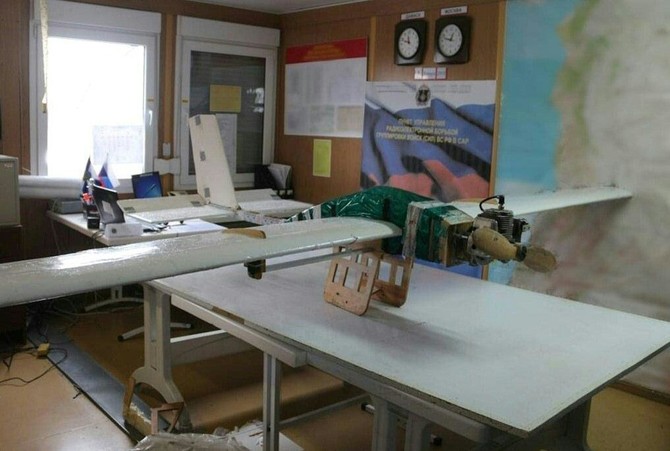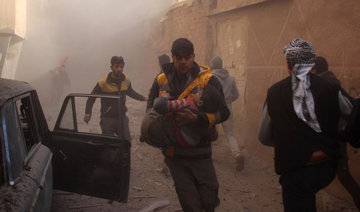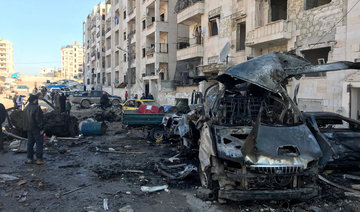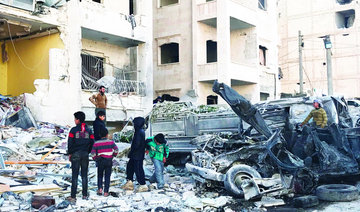MOSCOW: Russia said Tuesday that a recent series of drone attacks on its military bases in Syria would have required assistance from a country possessing satellite navigation technology — a statement that appeared to be aimed at the United States.
Russia’s Defense Ministry said its forces repelled a series of drone attacks Saturday on the Hemeimeem air base and a naval facility in Tartus, adding that out of the 13 drones involved, seven were shot down and six were forced to land without inflicting any damage.
Without blaming any specific country, the ministry said data for the attacks could only have been obtained “from one of the countries that possesses know-how in satellite navigation.”
In Tuesday’s statement, it noted a “strange coincidence” of a US military intelligence plane flying over the Mediterranean near the two Russian bases at the moment of the attack.
The US and Russia support opposing sides of the Syrian civil war.
Russian President Vladimir Putin declared victory in Syria last month and ordered a partial troops pullout, and the Kremlin said late Monday that the number of Russian troops left in Syria is sufficient for fending off any attacks by militants.
Asked Tuesday whether the withdrawal could have been premature in view of the drone attack, Putin’s spokesman Dmitry Peskov said the Russian forces in Syria have “all the necessary means” to counter any challenge.
Syria’s president Bashar Assad has recovered major territory in the country in the past two years, largely because of Russia’s military support. His forces are currently battling on two fronts, in the northwestern Idlib province and in the eastern suburbs of Damascus.
Opposition activists have reported airstrikes and shelling of rebel-held Damascus suburbs that killed and wounded dozens. The Britain-based Syrian Observatory for Human Rights said warplanes attacked several suburbs of Damascus, including Saqba, where a man and a child were killed and 13 others were wounded.
AFP reported Tuesday evening that 24 are dead in raids on the Gouta district, just outside of Damascus, including 10 children.
The Observatory and the Syrian Civil Defense, first responders known as the White Helmets, reported airstrikes on other suburbs, including Harasta and Douma.
Syria’s state news agency SANA said shelling of the capital Tuesday killed five people and wounded 30. SANA said 15 shells struck the central, predominantly Christian neighborhood of Bab Touma. The capital has been shelled on a near-daily basis in recent weeks.
Turkey’s foreign minister accused Syrian government forces of attacking moderate opposition fighters under the guise of fighting extremists.
Mevlut Cavusoglu’s comments came a day after Syrian government forces captured 14 villages as they advanced on Idlib, the largest rebel-held enclave in the country’s north, amid a wave of airstrikes. The troops aim to reach a rebel-held air base and secure the road linking the capital, Damascus, with the northern city of Aleppo, Syria’s largest.
The government offensive around Idlib has forced thousands of civilians to flee toward the border with Turkey.
Cavusoglu said Syrian government attacks on moderate opposition forces would “axe” peace efforts.
Turkey, which backs the opposition, and Russia and Iran, whose wide-ranging support for Assad has turned the war in his favor, have taken the lead in Syria peace efforts over the past year.
The UN humanitarian chief arrived in Damascus Tuesday to assess the humanitarian situation and discuss with government officials ways of improving access and aid delivery.
Mark Lowcock’s visit is the first by the head of the UN’s humanitarian agency since December 2015. The UN estimates that more than 13 million people need basic aid and protection across Syria. Lowcock is expected to meet government officials and visit the central city of Homs during his three-day visit.
Russia takes aim at US over series of Syria drone attacks
Russia takes aim at US over series of Syria drone attacks

Togo holds first-ever senate vote despite opposition outcry

- A leading opposition group, the Alliance of Democrats for Integral Development, or ADDI, has confirmed that it would participate in Saturday’s elections
LOME: Municipal and regional councilors began voting on Saturday in Togo’s first-ever senatorial elections amid fears that President Faure Gnassingbe is looking to use the new constitution to hold on to power indefinitely.
Several opposition parties have said they will boycott the vote, and civil society groups have denounced the parliamentary reform for the West African nation of 9 million people as rigged.
The new constitution replaces the direct election of the head of state with a parliamentary system, making the presidential position merely honorific.
Power will be transferred to the president of the Council of Ministers, a position currently held by Gnassingbe, who has led the country since 2005 when he took over from his father, who had been in power for 38 years.
Under the previous constitution, Gnassingbe was limited to one last presidential run in an election set for this year.
More than 1,500 municipal councilors and 179 regional councilors will elect 41 out of 61 new senate members from the 89 candidates standing.
The president of the Council of Ministers, or Gnassingbe, will appoint the rest of the senators.
“It’s a new constitution that we have never tested. We had to test it to see the sides that are not good and to appreciate the rest,” said municipal councilor Vimenyo Koffi, who voted on Saturday morning in the capital, Lome.
A leading opposition group, the Alliance of Democrats for Integral Development, or ADDI, has confirmed that it would participate in Saturday’s elections.
But several other opposition parties, including the National Alliance for Change, or ANC, and the Democratic Forces for the Republic, or FDR, have said they would boycott it, calling the overhaul and Senate vote a “constitutional coup d’etat.”
The ANC on Wednesday expressed its “firm rejection of this anti-democratic process that aims to install an illegal and illegitimate republic.”
Earlier in the week, FDR slammed a “parody” vote and said the Senate would be a costly institution “while our municipalities and regions painfully lack the financial means to address the population’s vital needs.”
The president’s supporters say the constitutional change ensures more representation.
Gnassingbe’s governing party, the Union for the Republic, won legislative elections last April in a landslide.
Opponents had called the ballot an “electoral hold-up” marred by “massive fraud.”
Daesh group claim bombing of Taliban ministry

- The suicide attacker attempted to enter the Afghan ministry of urban development and housing in Kabul
- He was shot by guards and detonated himself, Taliban government interior ministry said
KABUL: Daesh group on Saturday claimed responsibility for a suicide bombing of a Taliban government ministry in Afghanistan which killed one person and wounded at least three more this week.
Violence has waned in Afghanistan since the Taliban surged back to power and ended their insurgency in 2021, but the Daesh group frequently stages gun and bomb attacks challenging their rule.
The suicide attacker attempted to enter the Afghan ministry of urban development and housing in Kabul on Thursday but was shot by guards and detonated himself, Taliban government interior ministry spokesman Abdul Mateen Qani told AFP.
He said one person had been killed and three wounded but Kabul’s Emergency Hospital put the toll at one dead and five wounded — four of them critically — after the attack at around 9:30 am (0500 GMT).
A Daesh communique translated by the SITE Intelligence Group said the attacker “detonated his explosive vest on multiple officials and guards inside” a headquarters of “the apostate Taliban militia.”
On Wednesday, the group also claimed an attack on a north Afghanistan bank that killed eight people, saying it had targeted Taliban government employees collecting their salaries.
The Taliban government has declared security its highest priority since returning to power and analysts say they have had some success quashing Daesh with a sweeping crackdown.
However, the group remains active, targeting Taliban officials, visitors from abroad and foreign diplomats.
Daesh claimed responsibility for a suicide bombing that killed the Taliban government’s minister for refugees, Khalil Ur-Rahman Haqqani, inside his Kabul office in December.
Six civilians were also killed in an IS-claimed attack in 2023 that took place near the Taliban government’s heavily fortified foreign ministry.
A UN Security Council report released last week said the Daesh group were “the most serious threat to the de facto authorities, ethnic and religious minorities, the United Nations, foreign nationals and international representatives” in Afghanistan.
US-Europe differences come to the fore at Munich conference

- J.D. Vance’s blunt speech rattles European leaders
- He just put the Europeans on notice: There is a new sheriff in town
MUNICH: The Munich Security Conference brought the fault lines between Europe and the US over Ukraine, the international order and the transatlantic relationship to the view of world leaders and political and security experts from the opening session of the conference on Friday. I was in the room to listen to the anticipated speech by US Vice President J.D. Vance and I saw the disbelief on people’s faces when he started speaking. The room was packed, with dozens of people standing on staircases and balconies to hear Vance in person for lack of seating availability. He did not disappoint in shocking them. When he was received with applause, he joked: “I hope this is not the only applause I get.” He predicted correctly, and received polite applause only a couple of times.
What shocked people most was not his lecturing them on democracy, especially free speech, and attacking them on immigration, but the fact that the American vice president’s speech in the foremost international security conference did not mention Ukraine even once, and did not talk about any security and foreign policy issue. He just put the Europeans on notice: There is a new sheriff in town. The Europeans were there for the message, and actually got it during their meetings with Vance before the opening of the conference. Their concern was evident in their speeches to the crowded halls of the conference venue.
All the speeches were indirect or direct comments on the state of America and how Europe and the world should confront the phenomena called Donald Trump. From the opening statement of the conference’s chairman, Ambassador Christoph Heusgen, which highlighted “the rule of law and not the law of the strongest,” to the strong messages in the speech of German President Frank-Walter Steinmeier, it was obvious that Europe is readying itself to push back.
What rattled Europe most was the American president’s quick moves toward Russian President Vladimir Putin and their fears that they will be cut out of negotiations over ending the Ukraine war. You hear it everywhere: Europe and Ukraine should be at the table, and nothing about the war should be decided without Ukraine’s involvement.
Some criticized the new US administration’s negotiating style, with German Defense Minister Boris Pistorius taking issue with giving everything at the start of talks. “If I were (negotiating), I would know that I don’t take any essential point of negotiations off the table before the negotiations begin,” he said.
European Commission President Ursula von der Leyen warned that “authoritarians are watching whether you have impunity if you invade your neighbor,” in a reference to Europe’s fear that the US administration’s peace overtures to Putin may embolden others to invade their neighbors and get away with it.
Steinmeier highlighted how important it is not only to end the war, but to settle the conflict in a way that benefits Ukraine, Europe and the US. “That outcome — an end to this war — is what we all hope for. How this war concludes will have a lasting impact on our security order and on the influence of both Europe and the US in the world,” he said, adding: “I firmly believe that simply ‘making a deal and leaving’ would weaken us all: Ukraine and Europe but also the US. For this reason, every scenario — be it before or after the end of fighting — requires our combined power of deterrence and strength. That is why, in every scenario, support for Ukraine must continue — namely from Europe and the US.”
This sentiment was also echoed by Von der Leyen, who said that Ukraine “needs peace through strength.”
But despite their warnings and aversion to the new US administration’s approach, they highlighted the importance of stepping up defense spending, a key ask by Trump.
Steinmeier said: “Expenditure on security must continue to rise. Our Bundeswehr must become stronger. Not to wage war — but to prevent war.” He seemed to respond to Trump’s request when he said: “The 2 percent (defense spending) target, which we formally agreed in Wales in 2014, belongs to another era that was confronted with different threats. A decade on, we will need to spend considerably more than what was agreed back then.”
Von der Leyen also called for stepping up military spending, and warned that Europe had outsourced its defense.
The calls for Europe to stand up for itself were everywhere, as were the calls for unity but with the acknowledgment that Europe does not have the deterrent capability needed to confront the Putins of the world. But they seemed willing to resist. The words of the German president created the outlines of the push back by calling on Europe not to be intimidated by what is coming out of Washington.
He said: “We are subjects, not objects, in the international order. We must not allow ourselves to be paralyzed by the flood of announcements. We must not freeze in fear, or as the English saying goes: We cannot be like a deer in the headlights! It is clear that the new American administration holds a worldview that is very different from our own — one that shows no regard for established rules, for partnerships or for the trust that has been built over time.”
This was only the first day of the conference but it set the tone for what is awaiting the transatlantic relationship in the era of an even stronger and more “populist” US administration. This fear is real for Europe, and especially Germany, which faces crucial elections next week and where Vance met the far-right AfD leader and criticized efforts by German officials to avoid working with the party. It is a new era of what Europeans consider American election interference and America calls defense of democracy, which rests “on the sacred principle that the voice of the people matters.”
It is the dawn of a new uncharted transatlantic fist fight.
Zelensky calls for European army to deter Russia, earn US respect

- Zelensky said an address by US Vice President JD Vance the previous day had made clear the relationship between Europe and the United States was changing
- “Let’s be honest — now we can’t rule out the possibility that America might say no to Europe on issues that threaten it“
MUNICH: Ukrainian President Volodymyr Zelensky called on Saturday for the creation of a European army, saying the continent could no longer be sure of protection from the United States and would only get respect from Washington with a strong military.
He also said Kyiv would never accept any deal to end the Russia-Ukraine war made behind its back, and predicted Russian President Vladimir Putin would try to get US President Donald Trump to Moscow’s May 9 World War Two victory anniversary parade “not as a respected leader but as a prop in his own performance.”
In an impassioned speech to the annual Munich Security Conference of global policymakers, Zelensky said an address by US Vice President JD Vance the previous day had made clear the relationship between Europe and the United States was changing.
“Let’s be honest — now we can’t rule out the possibility that America might say no to Europe on issues that threaten it,” said Zelensky, speaking as the war triggered by Russia’s invasion of his country will soon enter its fourth year.
“Many, many leaders have talked about (a) Europe that needs its own military and army. An army of Europe. And I really believe the time has come, the armed forces of Europe must be created.”
He said a European army — which would include Ukraine — was necessary so that the continent’s “future depends only on Europeans — and decisions about Europeans are made in Europe.”
He continued: “Does America need Europe as a market? Yes. But as an ally? I don’t know. For the answer to be yes, Europe needs a single voice, not a dozen different ones.”
Trump administration officials have made clear in recent days that they expect European allies in NATO to take primary responsibility for their own defense as the US now had other priorities, such as border security and countering China.
They have also said, however, that they remain committed to the NATO transatlantic military alliance.
“America needs to see where Europe is heading,” Zelensky said, “and this direction of European policy shouldn’t just be promising, it should make America want to stand with a strong Europe.”
Trump shocked European allies by calling Putin this week without consulting them beforehand and declaring an immediate start to Ukraine peace talks.
Zelensky told the conference that he believed it would be “dangerous” if Trump met Putin before he and Trump meet.
Ukraine has repeatedly said it wants to come together with the United States and Europe to devise a joint strategy before any Trump-Putin meeting.
The Trump administration so far has left the impression among some European allies that it was making concessions to Putin at Ukraine’s expense before any negotiations begin, though remarks by some top US officials have raised confusion.
YOU COULD BE NEXT, ZELENSKIY WARNS
He also warned European leaders that their countries could be next to face a Russian attack.
“If this (Ukraine-Russia) war ends the wrong way, he (Putin) will have a surplus of battle-tested soldiers who know nothing but killing and looting,” he said, citing intelligence reports indicating Russia will dispatch troops to close ally Belarus, another neighbor of Ukraine, this summer.
European nations cooperate militarily primarily within NATO but governments have so far rejected various calls for the creation of a single European army over the years, arguing that defense is a matter of national sovereignty.
Zelensky argued that Europe building up military strength would be good not only for security but also for the continent’s economy. “This isn’t just about stockpiling weapons, it’s about jobs, technological leadership and economic trends for Europe.”
A senior official from an eastern member state of the European Union cast skepticism on Zelenkiy’s proposal for a European army, saying: “There is a European military force called NATO.”
NATO Secretary General Mark Rutte also told Europeans to get their acts together — but on Ukraine talks.
“And to my European friends, I would say, get into the debate, not by complaining that you might, yes or no, be at the table, but by coming up with concrete proposals, ideas, ramp up (defense) spending,” he said in Munich.
Looting in eastern Congo’s Bukavu as M23 rebels reach suburbs

- The stolen supplies would deepen the difficulties faced by those in need, Claude Kalinga said
- Two residents of the northern Bukavu suburb of Bagira said they had seen rebels on the streets and no sign of fighting.
CONGO: Chaotic scenes unfolded in the eastern Congo city of Bukavu on Saturday after Rwanda-backed M23 rebels reached its outskirts, while a threat by Uganda’s army chief to attack a Congolese town raised fears of the conflict flaring into a wider regional war.
The rebels have been pushing south toward Bukavu, the second-largest city in eastern Democratic Republic of Congo, since they seized Goma, the largest city, at the end of last month.
On Saturday, the World Food Programme’s depot in Bukavu, which housed 6,800 metric tons of food, was being looted, a spokesperson told Reuters.
The stolen supplies would deepen the difficulties faced by those in need, Claude Kalinga said, with the agency’s activities already suspended for weeks due to the deteriorating security situation.
Sporadic gunfire was heard overnight and into Saturday morning, according to multiple Bukavu residents, who said the shots were fired by looters.
Corneille Nangaa, leader of a rebel alliance that includes the M23, said on Friday evening that the rebels had entered Bukavu and would continue their operation in the city on Saturday.
Two residents of the northern Bukavu suburb of Bagira said they had seen rebels on the streets and no sign of fighting.
An M23 source, two Congolese army officers and multiple Bukavu residents, however, said on Saturday that the rebels had not yet entered the city center.
One of the army officers said soldiers were being evacuated in order to avoid “carnage” like in Goma. About 3,000 people were killed in the days preceding the capture of that city, according to the United Nations.
Congolese soldiers could be seen on the streets of Bukavu on Saturday, according to eyewitnesses. The soldiers set fire to a weapons depot at their army base there, according to five residents and a military source.
The capture of Bukavu, a city of about 2 million according to the mayor, would represent an unprecedented expansion of territory under the M23’s control since the latest insurgency started in 2022, and deal a further blow to Kinshasa’s authority in Congo’s eastern borderlands, which are rich in minerals.
On Saturday, the chief of Uganda’s defense forces, General Muhoozi Kainerugaba, said in a post on X that he would attack the town of Bunia in neighboring eastern Congo unless “all forces” there surrendered their arms within 24 hours.
The threat by Kainerugaba, whose father is President Yoweri Museveni, adds to fears that Africa’s Great Lakes region risks slipping back into a broader war reminiscent of conflicts in the 1990s and 2000s that killed millions.
Uganda’s military has since 2021 supported the Congolese army in its fight against Islamist militants in the east, and deployed another 1,000 soldiers there in late January and early February.
But UN experts say Uganda has also backed the ethnic Tutsi-led M23.
UN Secretary-General Antonio Guterres urged dialogue between the warring parties in a speech at an African Union (AU) summit in Addis Ababa on Saturday.
Leaders from Eastern and Southern African regional blocs last weekend also urged all parties to hold direct talks, but Congolese President Felix Tshisekedi has repeatedly refused to talk directly to the M23 and canceled his appearance at the AU summit, sending his prime minister to represent Congo.
Tshisekedi returned to Kinshasa on Saturday morning, according to the presidency, after attending the Munich Security Conference in Germany on Friday.
Kigali has denied backing M23, and President Paul Kagame said on Facebook on Saturday that he had told the AU peace and Security Council that “Rwanda has nothing to do with Congo’s problems.”
The United States has warned of possible sanctions against Rwandan and Congolese officials. The European Union said on Saturday it is considering using all the means at its disposal to protect Congo.






















